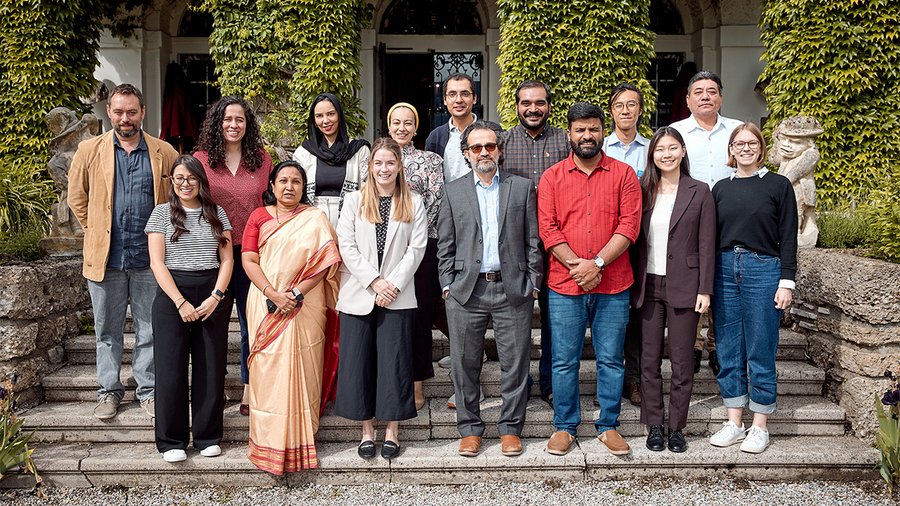In collaboration with the Brookings Institution Center for Universal Education, Salzburg Global hosted educators, policymakers, and researchers from Egypt, India, and Mexico to discuss invisible pedagogical mindsets and rethink the future of education
Educational practices and structures differ from country to country. Still, educators worldwide all seem to share at least two things: a vision for educational reform and the challenges obscuring this vision.
To tackle these challenges, the Center for Universal Education at Brookings launched the Strengthening Pedagogical Approaches for Relevant Knowledge and Skills (SPARKS) project. As part of SPARKS’ global network, the project brings together education actors from Egypt, India, and Mexico as Research Policy Collaboratives (RPCs) to discuss collaborative research initiatives and strengthen global networks in education. Change in education does not happen overnight, but as the RPCs convened for the first time at Salzburg Global, powerful ideas sparked.
Following initial research conducted by Omar Qargha and Rachel Dyl at Brookings, the RPCs are beginning to explore “invisible pedagogical mindsets” in their local contexts. What happens in the classroom goes beyond the curriculum and the teacher. Instead, it is the product of “invisible” components such as culture, learning theories, and education ecosystems that subconsciously influence pedagogical approaches and erect barriers to innovative pedagogy.
Shirisha Hazari, State KGBV and Gender Coordinator at School Education in the Government of Telangana, India, compared these invisible pedagogical mindsets to “stained glass” where “perspective is constructed by other stakeholders and systems”. These constructed perspectives reveal themselves from top to bottom, from conception to execution, in different areas and stages of education reform. Therefore, applying invisible pedagogical mindsets allows RPCs to understand education more in-depth and creates opportunities for collaboration.
Indeed, as RPCs continued their discussion on invisible pedagogical mindsets, they recognized that their challenges are a local manifestation of similar deeper dynamics of systems and culture. For instance, tensions in language instruction between Mayan and Spanish in Mexico or Arabic and English in Egypt are deeply rooted in culture. “We have more than 60 different indigenous languages, and each one of those languages represents different cultures,” said Gabriela Lozano Campos from Education for Sharing in Mexico, “It is challenging for the education system to address all these cultures and to really support the children and youth”.
Similarly, in India, children from diverse backgrounds study together in the classroom. Sreehari Ravindranath, psychologist and director of research and impact at Dream a Dream in India, observed that this becomes a challenge when teachers “are not compassionate in the classroom, and they don’t know what the children need or how they feel”. This issue can be partially alleviated through cultural sensitivity training for teachers so that they can understand the unique needs of their diverse students. However, this also entails inadvertently propagating the power imbalances embedded in education ecosystems, thereby reinforcing the primary need to address invisible pedagogical mindsets.
“[There is] an incentive to scapegoat teachers,” said Nariman Moustafa, president of the Initiative for Self-Discovery and Development in Egypt, “There is less willingness to open up on the hidden institutional messages, the ecosystem, the political economy, which decides what kind of support is given to teachers”. Classroom education is a result of local ecosystems and a complex web of stakeholders.
Invisible pedagogical mindsets highlight that teachers are part of a wider system, and their teaching is intrinsically tied to decisions beyond their control. As national educational reform continues in the RPCs’ countries, RPCs stressed the importance of a bottom-up approach that would consider and enable teachers.
Identifying these systemic challenges laid the path for the RPCs’ collaborative research. Through interactive feedback, each RPC furthered thinking on research designs and methodologies that aim to bridge the gap between policymaking and research. “There is a disconnect between a teacher in the classroom and the policymaker… [this] collaborative is to understand, listen, brainstorm, and discuss the challenges,” said Sreehari.
To better understand the gap, their projects plan to adopt mixed methods and facilitative approaches, bringing all stakeholders in education to the table. Sreehari continues, “Changes in perspective can influence how policies are framed”. For RPCs, it is about communicating this crucial perspective of invisible pedagogical mindsets because, without it, meaningful change remains elusive.
Whilst cross-culture collaboration between RPCs sparked new directions in research, RPCs emphasized that only local researchers can work with and understand local stakeholders. However, multilateral institutions, such as the World Bank and the UN, pursue agendas that inevitably influence national education policies and, ultimately, classroom practices. In this sense, international collaboration is about outreach. Nariman elaborates, “It is to seek platform[s] that believe in equal partnership, equality of voices, equality of intelligence, platforms like Brookings and Salzburg Global Seminar, and use these platform[s] and their existing relationships with veteran institutions to convey a more realistic picture of what’s happening on the ground.”
Invisible pedagogical mindsets are inherently difficult to entangle. Deeply rooted mindsets may take generations to dissolve, but RPCs and the Brookings Institution have taken a crucial first step during their time in Salzburg.


